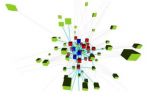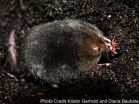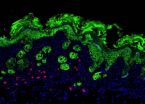(Press-News.org) Students who work together and interact online are more likely to be successful in their college classes, according to a study published Jan. 30 in the journal Nature Scientific Reports and co-authored by Manuel Cebrian, a computer scientist at the Jacobs School of Engineering at the University of California San Diego.
Cebrian and colleagues analyzed 80,000 interactions between 290 students in a collaborative learning environment for college courses. The major finding was that a higher number of online interactions was usually an indicator of a higher score in the class. High achievers also were more likely to form strong connections with other students and to exchange information in more complex ways. High achievers tended to form cliques, shutting out low-performing students from their interactions. Students who found themselves shut out were not only more likely to have lower grades; they were also more likely to drop out of the class entirely.
"Elite groups of highly connected individuals formed in the first days of the course," said Cebrian, who also is a Senior Researcher at National ICT Australia Ltd, Australia's Information and Communications Technology Research Centre of Excellence. "For the first time, we showed that there is a very strong correspondence between social interaction and exchange of information - a 72 percent correlation," he said "but almost equally interesting is the fact that these high-performing students form 'rich-clubs', which shield themselves from low-performing students, despite the significant efforts by these lower-ranking students to join them. The weaker students try hard to engage with the elite group intensively, but can't. This ends up having a marked correlation with their dropout rates."
This study co-authored by Luis M. Vaquero, based at Hewlett-Packard UK Labs, shows a way that we might better identify patterns in the classroom that can trigger early dropout alarms, allowing more time for educators to help the student and, ideally, reduce those rates through appropriate social network interventions.
Cebrian's work is part of UC San Diego's wider research effort at the intersection of the computer and social sciences, lead by Prof. James H. Fowler, to enhance our understanding of the ways in which people share information and how this impacts areas of national significance, such as the spread of health-related or political behavior.
INFORMATION:
Working alone won't get you good grades
2013-01-31
ELSE PRESS RELEASES FROM THIS DATE:
Adding new members to group increases distrust among older members, impacts coordination
2013-01-31
Adding a new member to a working group can create distrust between members and hinder group functions, but a new study suggests that the distrust created is between older group members rather than about the newcomers- especially when previous group performance with just the older group members is poor. The results are part of a study published January 30 in the open access journal PLOS ONE by Matthew McCarter and Roman Sheremeta from Chapman University (U.S).
Previous studies report that changing members in an existing group hurts group performance, but the underlying ...
Leading by the nose: Star-nosed mole reveals how mammals perceive touch, pain
2013-01-31
The most sensitive patch of mammalian skin known to us isn't human but on the star-shaped tip of the star-nosed mole's snout. Researchers studying this organ have found that the star has a higher proportion of touch-sensitive nerve endings than pain receptors, according to a study published January 30 in the open access journal PLOS ONE by Diana Bautista and colleagues from the University of California, Berkeley and Vanderbilt University.
Touch and pain are closely intertwined sensations, but very little is known about how these sensations are detected in our cells. In ...
Chimp see, chimp learn: First evidence for chimps improving tool use techniques by watching others
2013-01-31
VIDEO:
This video shows the "dipping " technique performed by chimpanzee Ayumu. Note that he uses his mouth to insert the tube into the bottle. In form, his technique is identical to...
Click here for more information.
Chimps can learn more efficient ways to use a tool by watching what others do, according to research published January 30 in the open access journal PLOS ONE by Shinya Yamamoto and colleagues from Kyoto University and Kent University, UK. Their study ...
Tapeworm eggs discovered in 270 million year old fossil shark feces
2013-01-31
A cluster of tapeworm eggs discovered in 270-million-year-old fossilized shark feces suggests that intestinal parasites in vertebrates are much older than previously known, according to research published January 30 in the open access journal PLOS ONE by Paula Dentzien-Dias and colleagues from the Federal University of Rio Grande, Brazil.
Remains of such parasites in vertebrates from this era are rare- of 500 samples examined, only one revealed the tapeworm eggs. This particular discovery helps establish a timeline for the evolution of present-day parasitic tapeworms ...
Pact invests US $109 million to secure critical genetic material, maintain global food production
2013-01-31
Contact: Michelle Geis
mgeis@burnesscommunications.com
301-280-5712
Contact: Susan Tonassi
301-280-5711
stonassi@burnesscommunications.com
Pact invests US $109 million to secure critical genetic material, maintain global food production
CGIAR consortium partners with global crop diversity trust to revitalize genebanks housing scores of crops considered essential to food security
BONN, GERMANY (31 JANUARY 2013)—Concerned that inconsistent funding eventually could weaken a global network of seed banks at a time when farmers face unprecedented challenges, two ...
Forsyth scientists gain new understanding of latent tuberculosis
2013-01-31
Scientists at the Forsyth have gained new insight on how Tuberculosis (TB) remains a global epidemic. Although drugs have been available to fight TB for 50 years, the disease still infects nearly 2.2 billion people worldwide and causes 1.7 million annual deaths. This is largely attributed to the bacteria's ability to stay dormant in the human body and later resurface as active disease. The Forsyth team, and its collaborators from Stanford University, has recently discovered that Mycobacterium tuberculosis, the bacteria that causes TB, can lay dormant and thrive within ...
Itching for new help for eczema: Recently identified immune cells possible therapeutic target
2013-01-31
PHILADELPHIA - The increasing incidence of allergic skin diseases, and the accompanying economic burden and heightened risk of developing other allergic conditions, have spurred researchers to look for better ways to control these immune system-based disorders.
Atopic dermatitis, more commonly called eczema, now affects 10 to 20 percent of children in the United States and direct health-care costs exceed $3 billion, according to the National Institute of Arthritis and Musculoskeletal and Skin Diseases. What's more, up to 50 percent of children with atopic dermatitis ...
Scientists may have received millions in duplicate funding
2013-01-31
Big Data computation at the Virginia Bioinformatics Institute at Virginia Tech reveals that over the past two decades funding agencies may have awarded millions and possibly billions of dollars to scientists who submitted the same grant request multiple times — and accepted duplicate funding.
An analysis led by Harold R. Garner, a professor at Virginia Tech, not only indicates that millions in funding may have been granted and used inappropriately, it points to techniques to uncover existing instances of duplicate funding and ways to prevent it in the future. The analysis ...
Setting the stage for a new paradigm in treatment of heart failure
2013-01-31
CHAPEL HILL, N.C. – Despite a substantial increase in the number of people suffering the debilitating and often deadly effects of heart failure, treatments for the condition have not advanced significantly for at least 10 years. An analysis by researchers at the University of North Carolina School of Medicine shows new breakthroughs could be closer than we thought.
The analysis points to striking similarities between heart cells in patients with heart failure and brain cells in patients with Alzheimer's disease, raising the possibility that some treatment approaches being ...
Current evidence does not support selenium for preventing heart disease in well-nourished adults
2013-01-31
A systematic review published today in The Cochrane Library finds that in well-nourished adults current evidence does not support selenium for preventing heart disease. The review suggests that taking selenium supplements does not reduce a person's risk of developing heart disease, although most evidence is currently limited to healthy American adults.
Diet is a key factor influencing heart disease risk. Selenium is one dietary element that could potentially play a role in preventing heart disease by protecting against oxidative stress and inflammation. It is a common ...




